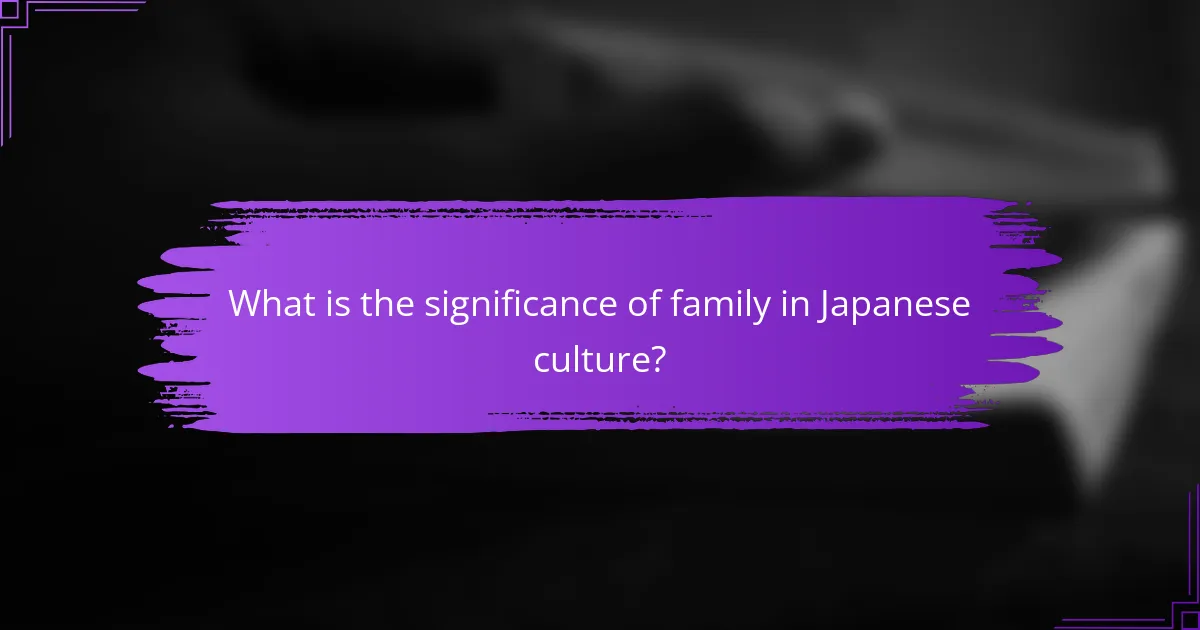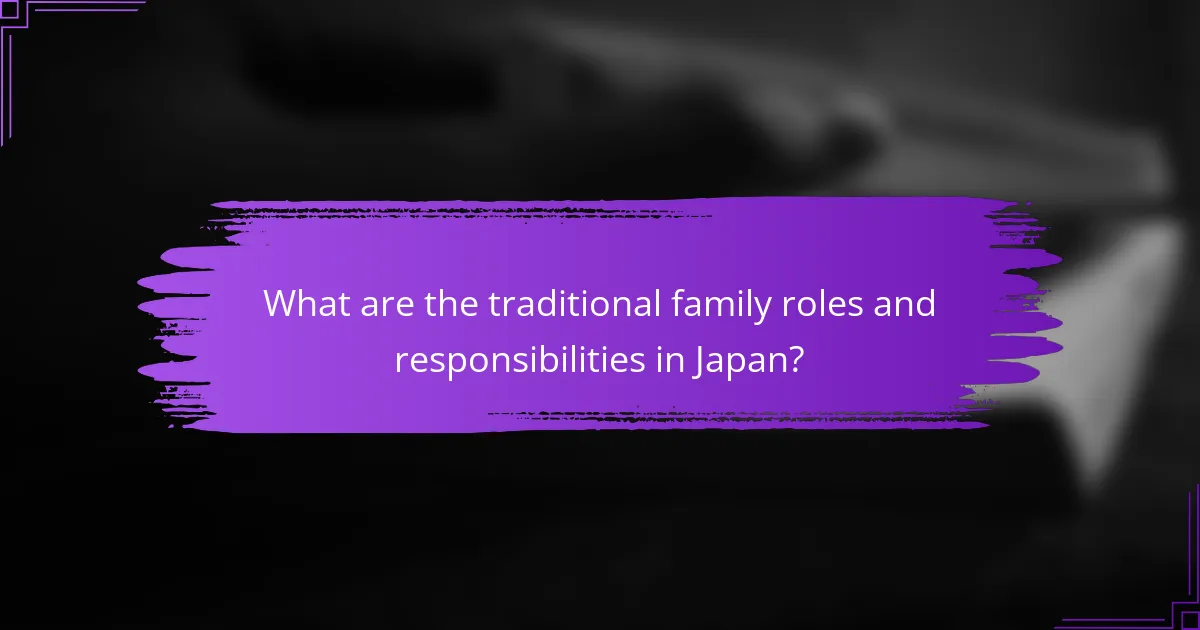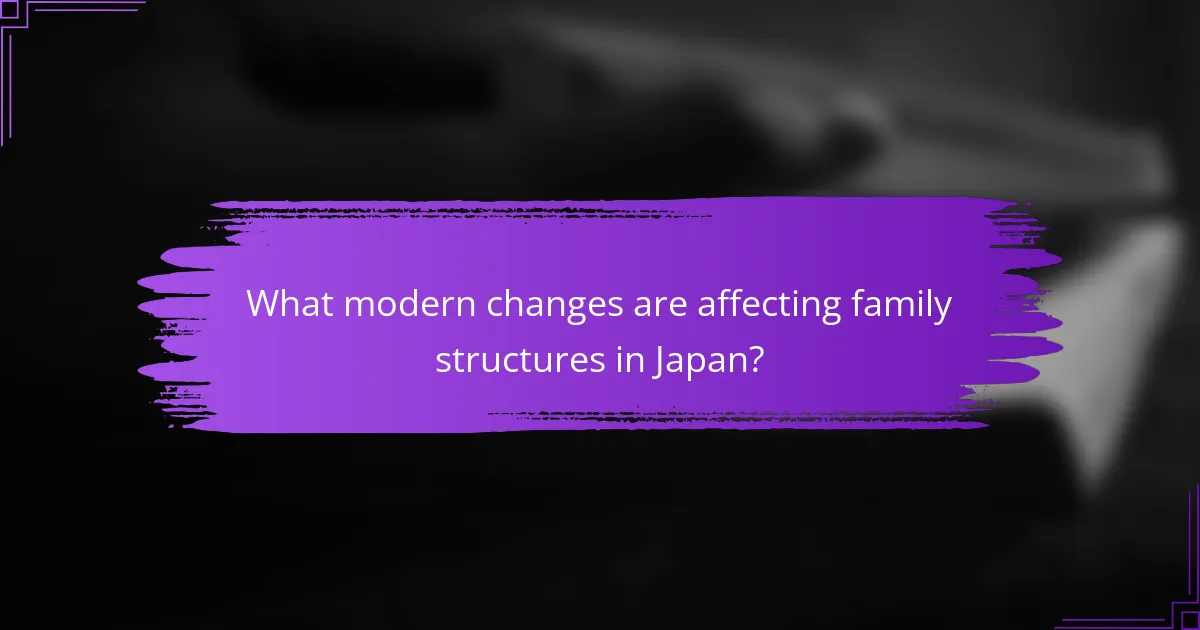
What is the significance of family in Japanese culture?
Family is central to Japanese culture, embodying values of respect, loyalty, and social harmony. The family unit traditionally serves as the foundation for social structure. In Japan, filial piety is highly valued, emphasizing respect for elders and ancestors. This cultural norm is rooted in Confucian principles, which influence family dynamics. Family gatherings are common during festivals and holidays, reinforcing bonds and traditions. The concept of “ie,” or the family system, historically prioritized lineage and inheritance. In modern times, while family structures have evolved, the significance of family remains strong. Surveys indicate that over 80% of Japanese people prioritize family relationships in their lives.
How do traditional values shape family structures in Japan?
Traditional values significantly shape family structures in Japan. These values emphasize filial piety, respect for elders, and the importance of harmony. The concept of “ie,” or family lineage, reinforces the idea of family as a collective unit. This structure often prioritizes the needs of the family over individual desires. Traditionally, family roles are clearly defined, with men as breadwinners and women as caregivers. This division of labor has been influenced by historical norms and societal expectations. Additionally, the practice of multi-generational living is common, reflecting the value placed on family cohesion. Studies show that these traditional values continue to influence modern family dynamics, even as Japan faces demographic shifts.
What are the core values that define family life in Japan?
The core values that define family life in Japan include respect, harmony, and filial piety. Respect is fundamental in Japanese families, emphasizing deference to elders and authority figures. Harmony, or “wa,” is crucial for maintaining peaceful relationships and avoiding conflict within the family unit. Filial piety, or “oya-kō,” underscores the importance of honoring and caring for one’s parents and ancestors. These values are deeply rooted in Japanese culture, influenced by Confucian principles. For instance, family gatherings often center around showing respect to older generations. Additionally, Japanese families typically prioritize collective well-being over individual desires, reinforcing the value of harmony.
How do these values influence relationships within the family?
Values significantly influence relationships within the family. In Japanese culture, values such as respect, harmony, and filial piety shape family dynamics. Respect for elders fosters communication and strengthens bonds. Harmony promotes conflict avoidance, leading to a supportive environment. Filial piety encourages children to care for their parents, reinforcing loyalty and duty. These values create a sense of belonging and unity. They also guide family decision-making processes, ensuring collective interests are prioritized. Studies indicate that strong family values correlate with emotional well-being and stability among family members.
Why is family considered a fundamental aspect of Japanese identity?
Family is considered a fundamental aspect of Japanese identity due to its deep-rooted cultural significance. In Japan, family shapes social structure and individual behavior. The concept of “ie,” or family lineage, emphasizes continuity and respect for ancestors. This structure fosters loyalty and obligation among family members. Traditional values prioritize familial harmony and collective well-being over individual desires. Historical influences, such as Confucianism, reinforce the importance of family roles. Family gatherings and rituals strengthen bonds and cultural identity. Studies show that strong family ties correlate with social stability in Japan. Thus, family remains central to Japanese identity and societal function.
In what ways does family contribute to individual identity in Japan?
Family plays a crucial role in shaping individual identity in Japan. It influences values, beliefs, and social roles. Traditional family structures emphasize respect for elders and collective harmony. This fosters a sense of belonging and responsibility among family members. Family expectations often guide career choices and personal relationships. The concept of “ie,” or family lineage, reinforces identity through heritage and ancestry. Cultural practices, such as family gatherings and rituals, strengthen bonds and shared identity. Research shows that family ties in Japan are linked to emotional well-being and social stability. Overall, family is integral to the formation of individual identity in Japanese society.
How does the concept of ‘wa’ (harmony) relate to family dynamics?
The concept of ‘wa’ (harmony) significantly influences family dynamics in Japanese culture. ‘Wa’ emphasizes the importance of maintaining peaceful relationships within the family unit. This principle encourages open communication and mutual respect among family members. In Japanese families, conflict is often avoided to preserve harmony. Decisions are frequently made collectively to ensure everyone’s feelings are considered. The practice fosters a sense of belonging and emotional security. Research indicates that families that prioritize ‘wa’ tend to exhibit stronger bonds and resilience in times of stress. Thus, ‘wa’ plays a crucial role in shaping harmonious family interactions and supporting overall family cohesion.

What are the traditional family roles and responsibilities in Japan?
Traditional family roles in Japan are characterized by distinct responsibilities assigned to each member. The father typically serves as the primary breadwinner, providing financial support for the family. Mothers traditionally manage household duties and child-rearing responsibilities. In many families, the eldest son has the duty of caring for aging parents. Daughters are often expected to assist with household tasks and may take on caregiving roles as well. These roles are influenced by historical Confucian values that emphasize hierarchy and filial piety. Over time, modern influences have begun to reshape these roles, leading to more shared responsibilities in contemporary families. However, traditional expectations still hold significant cultural weight in many households.
How have gender roles evolved within Japanese families?
Gender roles within Japanese families have evolved significantly over the past few decades. Traditionally, men were seen as the primary breadwinners while women were responsible for household duties. This dynamic has shifted due to economic changes and increased female participation in the workforce. In 2020, about 70% of women in Japan were employed, compared to 50% in the 1980s. This shift has led to a more equitable distribution of household responsibilities. Men are increasingly participating in child-rearing and domestic chores. Cultural attitudes are gradually changing, with younger generations embracing more egalitarian views on gender roles. Studies indicate that families with shared responsibilities report higher levels of satisfaction. These changes reflect broader societal trends towards gender equality in Japan.
What traditional roles did men and women play in Japanese households?
In traditional Japanese households, men typically served as the primary breadwinners. They were responsible for earning income and making major financial decisions. Women, on the other hand, traditionally managed the household and raised the children. Their roles included cooking, cleaning, and maintaining family relationships. This division of labor reflected the broader societal norms of Japan during the Edo period and beyond. Historical texts indicate that men were expected to embody the role of the family leader. Women were often viewed as caretakers, with their contributions deemed essential for family harmony. This gendered division of roles has evolved, but its historical roots remain significant in understanding contemporary Japanese family dynamics.
How are these roles changing in modern Japanese society?
Roles in modern Japanese society are evolving due to various social and economic factors. Traditional gender roles are becoming less rigid. More women are entering the workforce, contributing to household income. This shift is changing family dynamics and responsibilities. Men are increasingly participating in childcare and household duties. The rise of dual-income families is now common. Younger generations prioritize work-life balance and personal fulfillment. These trends reflect broader global influences and changing societal expectations. The aging population is also impacting family roles, with more emphasis on elder care.
What is the impact of extended family on household dynamics?
Extended family significantly influences household dynamics by providing emotional support and shared responsibilities. This structure fosters a sense of belonging and security among family members. In Japanese culture, extended families often live together or maintain close ties, impacting daily interactions. Shared child-rearing practices are common, allowing for diverse perspectives in upbringing. Financial support from extended family members can alleviate economic burdens. Research indicates that households with extended family experience lower stress levels and increased resilience. The presence of extended family members enhances social networks, promoting community cohesion. Overall, extended family plays a crucial role in shaping the stability and functionality of households.
How do grandparents contribute to family life in Japan?
Grandparents play a vital role in family life in Japan. They often provide childcare support for working parents. This assistance allows parents to balance their careers and family responsibilities. Grandparents also pass down cultural traditions and values to younger generations. They share stories and experiences that strengthen family bonds. In many households, grandparents live with their children and grandchildren. This cohabitation fosters close family ties and mutual support. According to a 2018 survey by the Japan Institute for Labour Policy and Training, over 50% of grandparents actively participate in childcare. Their involvement is crucial in maintaining family unity and cultural heritage.
What are the benefits of multi-generational living arrangements?
Multi-generational living arrangements provide several benefits. These include financial savings through shared expenses. Family members can pool resources for housing, utilities, and groceries. Emotional support is another significant advantage. Living together fosters stronger familial bonds and reduces feelings of loneliness. Childcare becomes easier with more adults present to help. This arrangement allows for the transfer of cultural values and traditions across generations. According to a study by Pew Research Center, 20% of U.S. households are multi-generational, indicating a growing trend. Additionally, older adults can age in place more comfortably with family support.

What modern changes are affecting family structures in Japan?
Modern changes affecting family structures in Japan include declining birth rates and increasing single-person households. Japan’s total fertility rate fell to 1.34 in 2020, below the replacement level. Economic pressures contribute to delayed marriage and childbearing. Many young adults prioritize careers over starting families. Furthermore, societal norms are shifting towards acceptance of diverse family forms. There is a rise in dual-income households as more women enter the workforce. The aging population also impacts family dynamics, with more elderly individuals living alone. These factors collectively reshape traditional family structures in Japan.
How is urbanization influencing family dynamics?
Urbanization significantly influences family dynamics by altering living arrangements and social interactions. In urban areas, families often live in smaller spaces due to high housing costs. This leads to a shift from extended family living to nuclear family structures. The proximity to diverse communities affects traditional roles and relationships within families. Increased work opportunities in cities can lead to both parents working, changing childcare dynamics. Urbanization fosters a more individualistic culture, impacting collective family values. According to the 2020 Census, Japan saw a rise in single-person households, reflecting these changes. This trend indicates a departure from traditional family structures and roles.
What challenges do families face in urban settings?
Families in urban settings face several challenges. High living costs strain family budgets. Limited space affects family dynamics and privacy. Access to quality education can be competitive and expensive. Urban areas often have higher crime rates, impacting safety. Public transportation may be inadequate, complicating daily commutes. Social isolation can occur despite proximity to others. Noise and pollution affect family health and well-being. These factors collectively create a complex environment for families in urban areas.
How does urban living affect traditional family roles?
Urban living significantly alters traditional family roles. In urban areas, families often experience a shift towards more egalitarian structures. Both parents are more likely to work outside the home. This economic necessity changes the dynamics of household responsibilities. Traditional roles, such as women being primary caregivers, are challenged.
Children may also gain more independence in urban settings. They often attend schools farther from home. This leads to less parental supervision compared to rural environments. Urban living can foster diverse family structures, including single-parent and blended families.
According to a study by the Japan Institute for Labour Policy and Training, urban families report increased work-life balance challenges. This affects how family members interact and support each other. Urbanization, therefore, plays a crucial role in redefining family roles in Japan.
What role does technology play in modern Japanese families?
Technology plays a significant role in modern Japanese families by enhancing communication and daily life. Families use smartphones and messaging apps to stay connected, even when physically apart. Video calls allow for face-to-face interactions, bridging geographical distances. Smart home devices help manage household tasks efficiently, saving time for family activities. Technology also provides access to educational resources, supporting children’s learning at home. Online shopping simplifies grocery and household supply purchases, making life more convenient. Additionally, social media platforms enable families to share experiences and maintain relationships with extended family. Overall, technology fosters closer family ties and improves quality of life in Japanese households.
How are communication patterns changing with technology?
Communication patterns are changing with technology by increasingly favoring digital interactions over face-to-face communication. Text messaging and social media platforms are now primary modes of communication. This shift allows for instant connectivity regardless of geographic distance. In Japan, younger generations are particularly embracing these digital tools. Traditional family gatherings are becoming less frequent due to busy schedules and reliance on virtual communication. Studies show that 70% of Japanese youth prefer texting over voice calls. This trend reflects a broader global movement towards digital communication. As technology evolves, the way families interact is transforming significantly.
What impact does technology have on family bonding?
Technology can both enhance and hinder family bonding. It facilitates communication through instant messaging and video calls, allowing families to stay connected despite physical distances. Studies show that families using technology for shared activities report stronger bonds. However, excessive screen time can lead to reduced face-to-face interactions, negatively impacting relationships. A survey by the Pew Research Center found that 72% of families believe technology can create distractions during family time. Balancing technology use is essential for maintaining healthy family dynamics.
What strategies can families adopt to maintain strong bonds in a changing society?
Families can adopt several strategies to maintain strong bonds in a changing society. Regular family meetings encourage open communication and strengthen relationships. Shared activities, such as cooking or playing games, foster connection and collaboration. Participating in cultural traditions helps preserve family heritage and instills shared values. Setting aside dedicated family time reinforces commitment to one another. Utilizing technology for virtual gatherings maintains connections despite physical distance. Supporting each other’s individual pursuits encourages personal growth while strengthening familial ties. Research shows that families who engage in shared experiences report higher levels of satisfaction and cohesion.
How can families balance tradition and modernity in their relationships?
Families can balance tradition and modernity in their relationships by integrating traditional values with contemporary practices. They can maintain family rituals while embracing new communication methods. For instance, families might celebrate traditional festivals but also use social media to connect. Engaging in open discussions about values fosters understanding among generations. This approach encourages respect for heritage while adapting to modern life. Research shows that families who blend these aspects report stronger relationships. Therefore, balancing tradition and modernity leads to healthier family dynamics.
What practices can enhance family cohesion in contemporary Japan?
Practices that can enhance family cohesion in contemporary Japan include regular family meals, shared leisure activities, and open communication. Family meals foster bonding and create opportunities for discussion. Engaging in leisure activities, such as outings or sports, strengthens relationships through shared experiences. Open communication encourages family members to express their thoughts and feelings, promoting understanding and support. Research indicates that families who prioritize these practices report higher levels of satisfaction and connection.
The main entity of this article is the family within Japanese culture, which is deeply intertwined with values of respect, loyalty, and social harmony. The article explores the significance of family as a foundational social unit in Japan, highlighting traditional values like filial piety and the concept of “ie,” which emphasizes lineage and collective well-being. It examines how these values shape family structures, roles, and relationships, while also addressing modern changes such as urbanization and technology’s impact on family dynamics. Additionally, the article discusses the evolution of gender roles and the importance of extended family in maintaining cultural heritage and support systems.